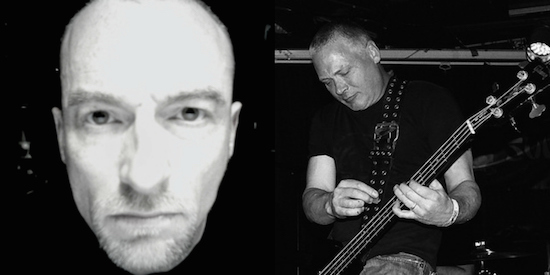Out of the ashes of Burning Witch, the Seattle doom-metal band that called it a day back in 1998 and later spawned Sunn O))), The Poisoned Glass has risen – which just goes to show that good things come to those who wait.
G. Stuart Dahlquist and Edgy59 have joined together to create a wholly different proposition, a heavier, more uncompromising outfit that began life as ‘Silent Vigil’ – a tonal bass solo that Dahlquist brought to Edgy and became a sonic blueprint for their punishing sound.
Their new album 10 Swords is a prime example of a band transcending its limitations; despite the restricted instrumentation the album is a dense, powerfully claustrophobic listen. It’s out today via Ritual Productions and the band play Desertfest on April 29, the culmination of a European tour they’re embarking on right now which will take in a date too at Bristol’s The Exchange on April 28.
And to top that all off, the band will also be at an album playback/signing session at London’s Rough Trade West on April 30. But don’t just read me talking about them – here they are, to have a light chat about the avant garde, the noisy and a bit of Socrates.
Could you talk about the influence of the avant garde on your music?
Edgy59: I believe the avant garde influences everything in our world. I have always held an obsession for sounds that push the limits of my perception and understanding in ways that are uncomfortable. It forces the listener into new directions. Lyrically I always try to challenge myself by exploring areas of my psyche that have yet to be brought to bear. This helps drive my live performances past the limits I have previously established for myself.
Stuart Dahlquist: The music, not so much, unless one considers the influence of avant garde across the spectrum from a historical perspective, I mean it’s touched every bit of contemporary music whether the artist considers it or not. Avant literature on the other hand has directly influenced my methods, particularly with regards to creating reincarnations of a specific progression; I like to write out music for bass and organ and shift the parts as they go along so the juxtaposition evolves with each successive movement and after a certain amount of shifts using this method finally resolves back to its starting point. Surely I’m not the first to do this technique with music composition but William Burroughs did this with his cut-up writing and that’s where I took my cues from.
Are you finding yourselves influenced by modern noise artists from outside metal?
E59: Yes. Coincidentally I am sitting in Blitz cafe in Oslo, Norway listening to some extreme noise projects at painfully high volume in an attempt to render myself tone-deaf before the show tonight. At this show we have drone-noise and death-noise projects Toft and Oilskin supporting us. I hope some of the other bands performing with us at venues like OCCII in Amsterdam or La Mechanique Ondulatoire in Paris will be as unsettling and noise-driven as these people.
S: Not so much but I love the visceral quality of this music, the loud stuff anyway. I know very little of modern noise, little of not-so-modern noise too.
How do you approach this outfit differently to Burning Witch, say, or your other projects?
E59: The approach brought to each project or band I’ve ever been in is relatively the same in that the challenge is to break new ground for yourself. This undertaking is what drives me to new levels of intensity or vulnerability.
S: Burning Witches was a band and the music was written as a cooperative effort from the very earliest moments of a song’s inception. The only band I’ve worked with since those days that has created music similarly is Brokaw (on Good To Die Records), a band that rehearsed together and wrote music together. The Poisoned Glass is only the second duo I’ve been involved with, the first being Dama/Libra with Joel RL Phelps. Joel and I wrote with no real intention of ever performing even a distant semblance of Dama/Libra as a duo… We could not do it. The Poisoned Glass, on the other hand, was written with the understanding that we will perform only as a duo so the orchestration was suitably limited. It’s a bit of a stretch but we seem to be basically pulling it off.
What are your thoughts on playing Desertfest?
E59: I am very much looking forward to being included in Desertfest, as well as our other actions taking place in London. We are also doing an in-store listening event at the Rough Trade West in Notting Hill, and this gives us an opportunity to directly engage with people who want that. Ending the tour at Desertfest will be like burning alive.
S: I have no idea what to expect.
And finally, what’s the significance of your band name?
E59: the name The Poisoned Glass is a concept of Stuart’s in reference to the death of Socrates. The symbolism in this should be interpreted by the listener themselves.
S: Primarily it’s a reference to the glass Socrates drank his hemlock potion from. There’s plenty of subtext contained in that act of course, but the vessel is the focus. Somewhere (and I’ll be damned if I can remember where) I read a translation of a phrase from Latin which explained the evil contained in the innocent, why nobody is innocent from day one – not even a glass.


